Add this eBook to your basket to receive access to all 1,674 records. Our indexes include entries for the spelling rowe. In the period you have requested, we have the following 1,674 records (displaying 1,221 to 1,230): These sample scans are from the original record. You will get scans of the full pages or articles where the surname you searched for has been found. Your web browser may prevent the sample windows from opening; in this case please change your browser settings to allow pop-up windows from this site. Trainee Schoolmistresses at Southlands
(1878)
The Education Department set examinations of trainee teachers at the various training colleges in Britain. This is the class list of the women who took examinations at the Teacher Training College at Christmas 1878. The names are given for the second year first, arranged by division in the examination (in order of merit for the first and second divisions), and then for the students of the first year, arranged similarly. Full names are given (with initials for middle names). The letter (D.) indicates that the candidate had obtained a certificate of competency as a teacher of drawing. (The sample scan is from a general class list for schoolmistresses) | Sample scan, click to enlarge
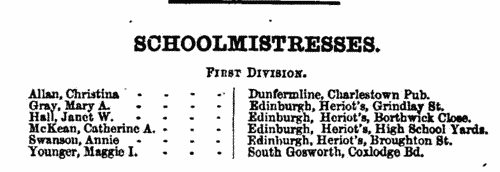
| Trainee Schoolmistresses in England and Wales
(1878)
The Education Department set examinations for candidates for admission into training colleges, and for the office of teacher. This is the list of successful female candidates from England and Wales at the examination at Midsummer 1878. The number in the first column shows order of merit in each class in the examination; then there is the name of the candidate (surname, christian name and any intermediate initial(s)), the school in which engaged, and the training college at which examined. The names of pupil teachers are shown in italics, with the 'school in which engaged' column left blank. These abbreviations are used in the names of schools: B., British; Bd., Board; Ch., Church of England; N., National; P., Parochial; R. C., Roman Catholic; U., Poor Law Union; W., Wesleyan Methodist. | Sample scan, click to enlarge
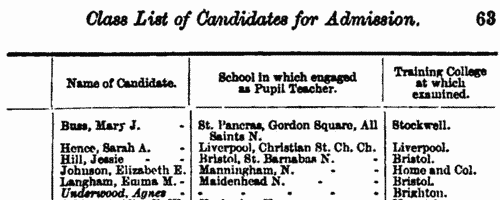
|  Men of the 13th Regiment of Foot (1st Somersetshire - Prince Albert's Light Infantry) fighting in South Africa
(1877-1879) Men of the 13th Regiment of Foot (1st Somersetshire - Prince Albert's Light Infantry) fighting in South Africa
(1877-1879)
What is commonly called the Zulu War Medal was awarded to those British soldiers who fought in a series of conflicts in southern Africa from 1877 (the Kaffir War) through to 1879 (the Zulu War). In 1880 the various units submitted returns of the officers, non-commissioned officers and men 'entitled to the Medal for Military Operations in South Africa during 1877-8-9' and these 'medal rolls' are now in the National Archives. The returns are made with the information arranged in twelve columns:
1. Rank and name
2. Regimental number and rank at the time the medal was earned
3. Whether in possession of medal for previous wars
4. Whether engaged against the Gaikas, Galekas and other Kaffir tribes 1877-8
5. Whether engaged against Pokwane 1878
6. Whether engaged against the Griquas 1878
7. Whether engaged against the Zulus 1879
8. Whether engaged against Sekukuni as set forth in Par. 2. G. O.
9. Whether engaged against Moirosi's stronghold
10. Entitled to medal without clasp under Par. 4.
11. Serving with regiment, depot, dead, discharged, deserted, &c.
12. Notes and cross-references to the Adjutant-General's medal lists.
WO 100/46.
| Sample scan, click to enlarge
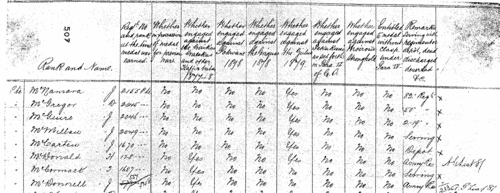
|  Men of the 3rd Regiment of Foot (East Kent - the Buffs) fighting in South Africa
(1877-1879) Men of the 3rd Regiment of Foot (East Kent - the Buffs) fighting in South Africa
(1877-1879)
What is commonly called the Zulu War Medal was awarded to those British soldiers who fought in a series of conflicts in southern Africa from 1877 (the Kaffir War) through to 1879 (the Zulu War). In 1880 the various units submitted returns of the officers, non-commissioned officers and men 'entitled to the Medal for Military Operations in South Africa during 1877-8-9' and these 'medal rolls' are now in the National Archives. The returns are made with the information arranged in twelve columns:
1. Rank and name
2. Regimental number and rank at the time the medal was earned
3. Whether in possession of medal for previous wars
4. Whether engaged against the Gaikas, Galekas and other Kaffir tribes 1877-8
5. Whether engaged against Pokwane 1878
6. Whether engaged against the Griquas 1878
7. Whether engaged against the Zulus 1879
8. Whether engaged against Sekukuni as set forth in Par. 2. G. O.
9. Whether engaged against Moirosi's stronghold
10. Entitled to medal without clasp under Par. 4.
11. Serving with regiment, depot, dead, discharged, deserted, &c.
12. Notes and cross-references to the Adjutant-General's medal lists.
WO 100/46.
| Sample scan, click to enlarge
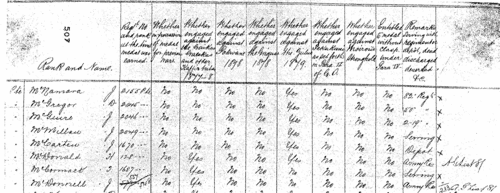
|  Men of the 4th Regiment of Foot (The King's Own Royal) fighting in South Africa
(1877-1879) Men of the 4th Regiment of Foot (The King's Own Royal) fighting in South Africa
(1877-1879)
What is commonly called the Zulu War Medal was awarded to those British soldiers who fought in a series of conflicts in southern Africa from 1877 (the Kaffir War) through to 1879 (the Zulu War). In 1880 the various units submitted returns of the officers, non-commissioned officers and men 'entitled to the Medal for Military Operations in South Africa during 1877-8-9' and these 'medal rolls' are now in the National Archives. The returns are made with the information arranged in twelve columns:
1. Rank and name
2. Regimental number and rank at the time the medal was earned
3. Whether in possession of medal for previous wars
4. Whether engaged against the Gaikas, Galekas and other Kaffir tribes 1877-8
5. Whether engaged against Pokwane 1878
6. Whether engaged against the Griquas 1878
7. Whether engaged against the Zulus 1879
8. Whether engaged against Sekukuni as set forth in Par. 2. G. O.
9. Whether engaged against Moirosi's stronghold
10. Entitled to medal without clasp under Par. 4.
11. Serving with regiment, depot, dead, discharged, deserted, &c.
12. Notes and cross-references to the Adjutant-General's medal lists.
WO 100/46.
| Sample scan, click to enlarge
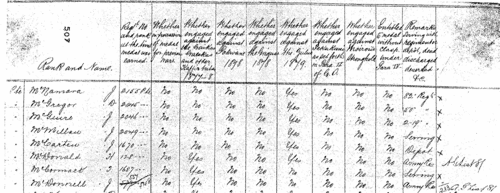
|  Men of the Royal Artillery fighting in South Africa
(1877-1879) Men of the Royal Artillery fighting in South Africa
(1877-1879)
What is commonly called the Zulu War Medal was awarded to those British soldiers who fought in a series of conflicts in southern Africa from 1877 (the Kaffir War) through to 1879 (the Zulu War). In 1880 the various units submitted returns of the officers, non-commissioned officers and men 'entitled to the Medal for Military Operations in South Africa during 1877-8-9' and these 'medal rolls' are now in the National Archives. The returns are made with the information arranged in twelve columns:
1. Rank and name
2. Regimental number and rank at the time the medal was earned
3. Whether in possession of medal for previous wars
4. Whether engaged against the Gaikas, Galekas and other Kaffir tribes 1877-8
5. Whether engaged against Pokwane 1878
6. Whether engaged against the Griquas 1878
7. Whether engaged against the Zulus 1879
8. Whether engaged against Sekukuni as set forth in Par. 2. G. O.
9. Whether engaged against Moirosi's stronghold
10. Entitled to medal without clasp under Par. 4.
11. Serving with regiment, depot, dead, discharged, deserted, &c.
12. Notes and cross-references to the Adjutant-General's medal lists.
WO 100/46.
| Sample scan, click to enlarge
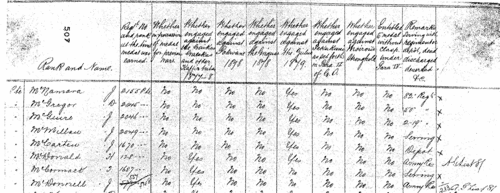
|  Zulu War Medal Roll: 57th (West Middlesex) Regiment of Foot
(1879) Zulu War Medal Roll: 57th (West Middlesex) Regiment of Foot
(1879)
List of Officers, Non Commissioned Officers, and men, entitled to the medal for military operations in South Africa, during 1877-8-9, and the names of those soldiers who would have been entitled except for Desertion, or Misconduct. The thirteen columns of the return give these details:
[Rank:]
[Name:]
[Regtl. No. and Rank at the time Medal was earned:]
[Whether in possession of medal for Previous Wars:]
[Whether engaged against the Gaikas, Galekas and other Kaffir tribes 1877-8:]
[Whether engaged against Pokwane 1878:]
[Whether engaged against the Griquas 1878:]
[Whether engaged against the Zulus in 1879:]
[Whether engaged against Sekukuni as set forth in Par II of G. O.:]
[Whether engaged against Moirosiís stronghold:]
[Entitled to Medal with clasp under Para. IV:]
[Remarks Serving with Regiment or depot dead discharged deserted &c:]
[An empty column for notes]
This regiment's actions were almost exclusively against the Zulus in 1879. WO 100/47
| Sample scan, click to enlarge

| Bankrupts, Assignees, Trustees and Solicitors
(1880)
Bankruptcy notices in England and Wales, January to March 1880 | Sample scan, click to enlarge

| Bankrupts, Assignees, Trustees and Solicitors
(1880)
Bankruptcy notices in England and Wales, July to September 1880 | Sample scan, click to enlarge

| Boys entering Clifton College
(1880)
Clifton College near Bristol was established in 1862. This edition of the Clifton College Annals and Register for the Old Cliftonian Society by F. Borwick was published in 1925. Boys are listed alphabetically by term of entry, with full names, surname first, in bold. Father's (or widowed mother's) name is given (surname and initials) in capitals, and address. Then there is the name of the house (N. T., North Town; S. H., School House; S. T., South Town), first and last forms, distinctions in school work and games, and month of leaving. Where known, the editor then gave a career summary with month of death; or, if still living, address as in 1925 (in italics). | Sample scan, click to enlarge
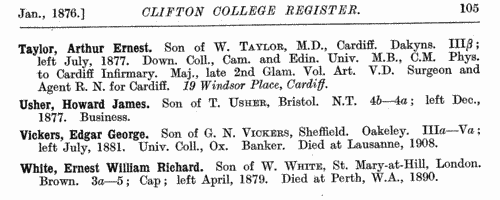
|
Research your ancestry, family history, genealogy and one-name study by direct access to original records and archives indexed by surname.
|












